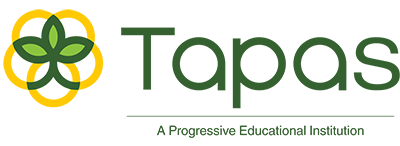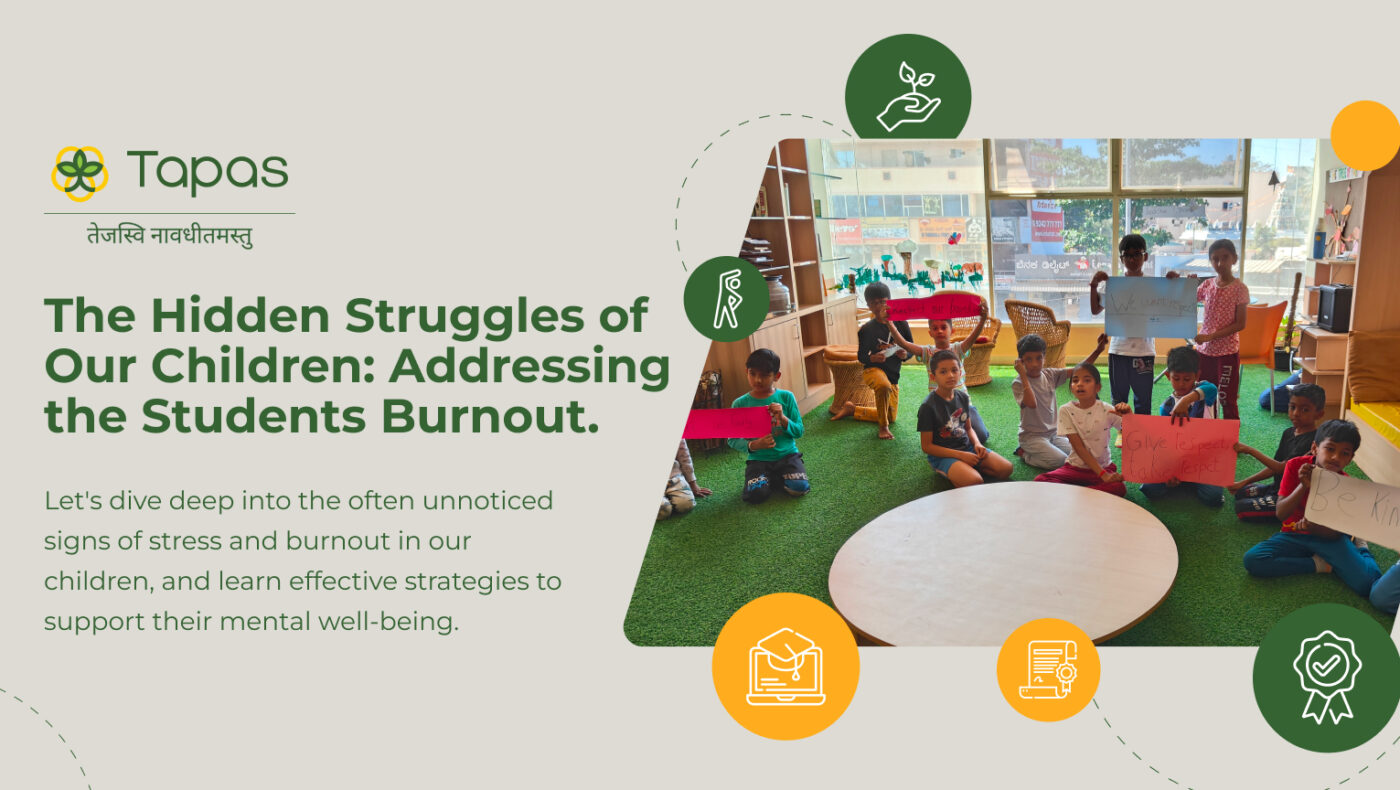Hello, Parents and Educators!
I’m Ms. Preethi Vickram, Founder of Tapas Progressive School.
At Tapas, our mission is driven by a vision to not just educate but to deeply understand and nurture each child’s potential. Today, I want to address an issue that’s often overlooked yet significantly impacts our children’s well-being—stress and student burnout.
As parents and educators, it’s easy to miss the signs. We see our children going about their daily routines, juggling school work, extracurriculars, and social lives, and we often don’t realise how much they’re actually handling. But have you ever stopped to consider that a child attending school for 30 hours a week might be more burnt out than an adult working twice those hours?
Getting Confused About How This Is Possible? Let me explain it from an adult’s perspective:
Imagine this: every day at work, you’re bound by stringent rules, fed information that doesn’t resonate with you, and constantly assessed not on your understanding but solely on your ability to recall details under pressure. Imagine the stress and the frustration building up, day after day. Now, if this paints an exhausting picture, think about our children who are in similar, if not the same, situations.
The scenario becomes even more disheartening when these young minds feel the immense pressure but are afraid to express their stress and fatigue. It’s not just about the overwhelming tasks they face; it’s about feeling trapped in a system that doesn’t acknowledge their struggles or their need for a supportive learning environment.
Why This Burnout?
It stems largely from the traditional educational systems that dominate our landscape. These systems often focus more on rote memorization than on actual learning, more on following rigid guidelines than fostering genuine intellectual growth.
This approach not only stifles creativity but also significantly hampers emotional and social development.
And think about this: our children endure this stress and burnout for years, molding into something they were never meant to be. Then, as they step into adulthood, we place the burden of expectations on their shoulders—expecting them to be leaders, decision-makers, and problem solvers. But how is that possible? How can we expect them to excel in these roles if we’ve never truly prepared them for it? We’ve asked them to follow, not to lead; to repeat, not to create; to conform, not to challenge.
Would You Follow My Advice If I Showed You How Our Kids Could Become Exceptional Decision-Makers and Excel in Their Endeavours?
At Tapas, we’ve completely flipped traditional methods to ensure that education goes beyond merely feeding information. We focus on nurturing critical thinkers and proactive individuals, preparing them not just to learn but to excel in real-world challenges.
Here’s what we do differently at Tapas—and what you can implement at home too:
1- Empowering Choice: We strongly believe in empowering our students with the ability to make choices, as this enhances their decision-making skills and strengthens their critical thinking. Engage your child in everyday decisions at home to prepare them for bigger choices in life. For instance, when buying something for the home, consider taking their advice or asking for their opinion. If you’re planning a family vacation, involve them in the discussion—ask what destinations they would prefer or what activities they’d like to do. Even involve them in financial decisions, like setting a budget for gifts or choosing savings goals. From the smallest decisions, like choosing a movie to watch, to significant ones like planning holiday activities, involving them helps develop a strong sense of responsibility and boosts their confidence in making choices.
2- Democratic Rule-Setting: We encourage a democratic environment where students and children are invited to discuss and set the rules in their classrooms and homes. This not only fosters a sense of ownership but also makes them feel respected and valued in their own spaces. Rules are essential as they provide structure and enable systems to function effectively, but when these rules are democratically established rather than imposed, children are more likely to adhere to them with enthusiasm.
For example, at Tapas, when it came time to decide on a school uniform policy, we involved the students in the discussion. Many expressed that they did not want to wear uniforms daily. We took this opportunity to explain the benefits of uniformity and its role in fostering a sense of community. After a thoughtful dialogue, we reached a mutual decision: students would wear uniforms only during special events and on certain days. This compromise respected their preferences while maintaining the school’s values, demonstrating the effectiveness of collaborative rule-setting
3- Learning from Failure: Instead of striving for perfection, we focus on learning from failures. This teaches our students that it’s okay to fail and that real growth comes from understanding and overcoming setbacks. To help instil this mindset at home, consider having weekly discussions with your child about your own experiences with failure.
Share stories about times you faced challenges and how you learned from or overcame them. This not only normalises failure but also demonstrates that setbacks are universal and can be valuable learning opportunities. Such discussions can foster a healthy perspective on failure, encouraging your child to approach challenges with resilience and openness.
Watch this video where I delve deeper into these practices and explain how they can significantly reduce student burnout: Click Here –>
Engage with Us:
We’re keen to hear your thoughts on reducing student burnout and nurturing resilient, confident learners.
Message us on Facebook, share your feedback, or drop us an email.
Facebook Page Link: https://www.facebook.com/tapaseducation
Email id: [email protected]
Let’s collaborate to make education a more thoughtful, engaging, and stress-free journey for our children.
Stay connected by following us on our social platforms where we share more insights and updates about our innovative approaches at Tapas Progressive School.
Together, let’s reshape education to empower our future generations!

